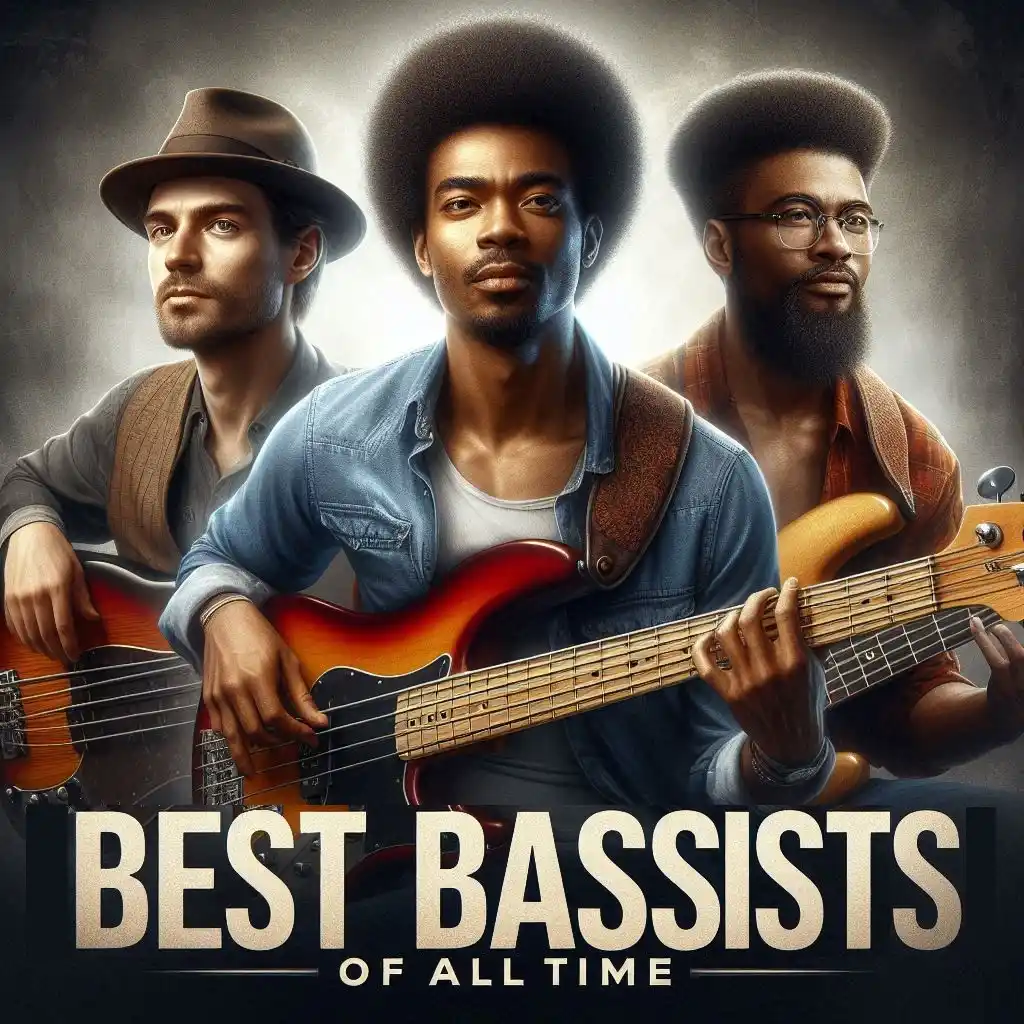
30 Best Bassists Of All Time
Bassists — the unsung heroes of the music world. These are the folks who lay the foundation, provide the backbone, and groove hard while doing it.
So, let’s explore the list of the best bassists of all time:
1. Jaco Pastorius
Known for: Weather Report, Solo Career
The world of jazz fusion would never be the same after Jaco stepped onto the scene. With his fretless bass guitar, he not only played bass lines but melodically soared with solos that were beautifully complex. “Portrait of Tracy” is a testament to his genius.
2. Paul McCartney
Known for: The Beatles, Wings, Solo Career
When you think of The Beatles, you might first think of their timeless melodies, but underneath it all was McCartney’s innovative bass playing. His melodic lines on tracks like “Come Together” or “Something” changed the way the world looked at bass guitar in rock music.
3. Geddy Lee
Known for: Rush
When you’re in a power trio like Rush, there’s a lot of musical space to cover. Geddy not only handled vocals and keyboards but also delivered intricate bass lines that held their own against Neil Peart’s drums and Alex Lifeson’s guitar.
4. Flea
Known for: Red Hot Chili Peppers
You can’t talk about slap bass without mentioning Flea. Bringing the funk to rock music, his energetic style and impeccable rhythm made tracks like “Give It Away” and “Higher Ground” groove super hard.
5. Bootsy Collins
Known for: Parliament-Funkadelic, Bootsy’s Rubber Band
If you’re looking for raw funk, look no further. With his star-shaped bass, Bootsy laid down some of the funkiest lines ever heard. His work with Parliament-Funkadelic set the gold standard for funk bassists.
6. John Entwistle
Known for: The Who
Nicknamed “The Ox” for his solid and unwavering style, Entwistle’s bass was often the lead instrument in many of The Who’s tracks. Listen to “My Generation” and you’ll know exactly what we’re talking about.
7. James Jamerson
Known for: Motown session bassist
Behind many Motown hits was the uncredited genius of James Jamerson. His complex lines and unique fingerstyle (he primarily used just one finger, which he called “The Hook”) brought depth to tracks by artists like Stevie Wonder, Marvin Gaye, and The Temptations.
8. Les Claypool
Known for: Primus
If there ever was a bassist who made the instrument sound completely out of this world, it’s Les Claypool. With a mix of slap, tap, and a bunch of other techniques we’re pretty sure he invented, his bass lines are truly one-of-a-kind.
9. Victor Wooten
Known for: Béla Fleck and the Flecktones, Solo Career
A masterclass in bass playing, Victor Wooten is often regarded as one of the greatest bassists of all time. His solo work showcases the limitless potential of the instrument.
10. Cliff Burton
Known for: Metallica
Metal and bass guitar might sound like an unlikely pairing, but Cliff Burton showed the world how it’s done. His solos, like the one in “Anesthesia – Pulling Teeth,” demonstrated that a bass could be as powerful as any guitar.
11. Marcus Miller
Known for: Session bassist, Solo Career
A multi-instrumentalist, Marcus Miller is known for his smooth bass lines, particularly in jazz and R&B. As a session musician, he’s added his touch to over 500 recordings including with legends like Miles Davis.
12. Carol Kaye
Known for: The Wrecking Crew
One of the most prolific bassists you’ve probably never heard of, Carol Kaye was part of the legendary Wrecking Crew, a group of session musicians in Los Angeles. She’s played on countless hits, from The Beach Boys to Simon & Garfunkel.
13. Mike Dirnt
Known for: Green Day
Punk rock might be about raw power, but Mike Dirnt added a melodic touch to it. His driving lines provided a solid foundation for Green Day’s hits, ensuring the bass was more than just a background instrument.
14. Larry Graham
Known for: Sly and the Family Stone, Graham Central Station
Often credited as the inventor of the slap-pop playing style, Larry Graham’s impact on bass playing is undeniable. His groovy bass lines gave funk a whole new dimension.
15. Stanley Clarke
Known for: Return to Forever, Solo Career
Jazz, rock, funk – you name it, and Stanley Clarke has made his mark. His impeccable technique and innovative playing style, combined with his ability to effortlessly switch between electric and double bass, make him a standout in any lineup.
16. Tim Commerford
Known for: Rage Against the Machine, Audioslave
Rage’s sound was unmistakable – a fusion of rock and rap, with radical politics thrown in for good measure. At the heart of it all was Tim’s intricate, aggressive bass work. His ability to switch between melodic runs and intense riffs was central to tracks like “Killing in the Name” and “Bulls on Parade.”
17. John Paul Jones
Known for: Led Zeppelin
While Jimmy Page and Robert Plant often grabbed the spotlight, lurking in the background was the genius of John Paul Jones. His technical prowess combined with a feel for exactly what the song needed made tracks like “Ramble On” and “The Lemon Song” masterpieces of bass work.
18. Jack Bruce
Known for: Cream
In a supergroup like Cream, where every member was a virtuoso, Jack Bruce still managed to stand out. His jazz-infused style brought an unpredictability to his lines, shining in classics like “Sunshine of Your Love” and “White Room.”
19. Pino Palladino
Known for: Session Work, The Who, John Mayer Trio
Pino’s the guy you call when you need your song to have THAT bass line. With his fretless bass, he’s added his signature touch to tracks from artists as varied as Paul Young to D’Angelo. His silky smooth lines are a treat for the ears.
20. Justin Chancellor
Known for: Tool
In the complex sonic landscape of Tool, Justin’s bass often leads the charge. His sound is atmospheric, heavy, and melodic all at once. Songs like “Schism” are perfect examples of his innovative approach.
21. Chris Squire
Known for: Yes
Progressive rock can be a beast, with its shifting time signatures and sprawling compositions. Chris Squire navigated this territory like a champ. His bass was often the anchor, allowing the rest of Yes to experiment. Tracks like “Roundabout” are pure bass magic.
22. Charles Mingus
Known for: Jazz Double Bassist
Stepping into the jazz realm, Charles Mingus was much more than just a bassist. Composer, bandleader, and instrumentalist, his approach to the double bass was revolutionary. Mingus’s compositions often gave the bass a lead role, something previously unheard of in jazz.
23. Kim Deal
Known for: The Pixies, The Breeders
In the indie and alternative world, few bassists are as revered as Kim Deal. Her lines are simple yet unforgettable, providing the foundation for The Pixies’ groundbreaking sound. Songs like “Where Is My Mind?” showcase her understated brilliance.
24. Donald “Duck” Dunn
Known for: Booker T. & the M.G.’s, Blues Brothers
A cornerstone of the Stax Records sound, Dunn’s bass lines are a journey into soul and R&B at its finest. His work on classics like “Green Onions” and “Soul Man” still resonates today.
25. Lemmy Kilmister
Known for: Motörhead
Raw, aggressive, and unapologetically loud, Lemmy’s approach to bass was like no other. Playing his Rickenbacker like it was a lead guitar, he delivered riffs that were the backbone of Motörhead’s heavy sound. “Ace of Spades” remains a testament to his iconic style.
26. Aston “Family Man” Barrett
Known for: Bob Marley & The Wailers
Reggae might be about the laid-back vibes, but it takes a master to make it groove. Barrett’s bass lines, with their distinctive off-beat rhythms, are a masterclass in reggae bass.
27. Nate Mendel
Known for: Foo Fighters, Sunny Day Real Estate
Behind the Foo Fighters’ massive rock anthems is Nate Mendel holding it all together. While Dave Grohl often gets the limelight, Mendel’s consistent and melodic bass lines provide the depth, particularly in tracks like “Everlong” and “Learn to Fly.”
28. Bernard Edwards
Known for: Chic
In the world of disco and funk, Bernard Edwards was a titan. His groovy and intricate lines on tracks like “Good Times” and “Le Freak” have influenced countless bassists in genres ranging from hip-hop to rock.
29. Phil Lesh
Known for: Grateful Dead
The Grateful Dead’s music was all about exploration, and Phil Lesh was at the forefront. His improvisational style meant no two performances were ever the same. Lesh approached the bass as a melodic instrument, often playing complex runs that added a unique layer to the Dead’s jams.
30. Paul Simonon
Known for: The Clash
Punk rock might be all about the three-chord songs, but Paul Simonon of The Clash showed that the bass could be both foundational and flashy. His iconic bass-smashing moment and groovy lines in songs like “London Calling” prove that simplicity, paired with passion, can make a world of difference.
